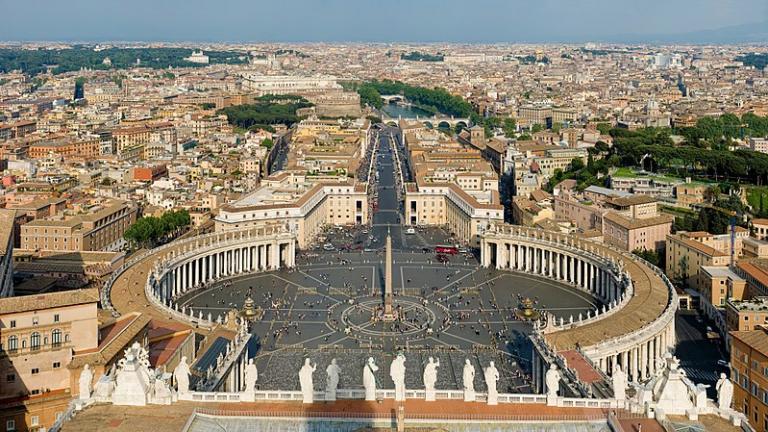Staying in and speaking out
Over the weekend, an especially toxic social media conversation unfolded on the page of overt anti-Semite E. Michael Jones. Jones shared a link to my recent NCR piece on the Biden administration, with the bizarrely worded question, “why is this woman a spokesman for Catholics?” Leaving aside for the moment his bizarrely gendered language, and his history of anti-Jewish hate speech, the obvious answer is: I am not. I am not a spokesperson for the Catholic Church. No one has appointed me spokesperson. I have no special faculty granted by the Vatican.
Or…am I a spokesperson for the Catholic church? Is it possible to separate “being Catholic” or “the Catholic faith” from being inextricably connected with—and thus in a sense responsible for—the deeds of our authorities, and the structure of our institution?
This question came up in an online discussion among Catholics and former Catholics recovering from institutional abuse at far-right religious organizations. Can we separate the Catholic faith from the institutional church? As Catholics who practice the faith, keeping alive the traditions, moving through the liturgical year, abiding by the rituals that help us to find grace in the ordinary, how complicit are we in the deeds of the church authorities who have ruled with authoritarianism and fear, marginalized the vulnerable, backed colonialism, instituted oppression, and too often stayed silent in the face of horrific abuses?
As a Catholic of Jewish ethnicity, it is especially unsettling for me to understand what the Catholic Church meant to so many Jews throughout history: not a source of comfort or bastion of peace. Anything but. How can I remain in a faith tradition that, to my own people, represents oppression and bigotry?
In October 2018 I participated in an event in Rome, hosted by the international organization Catholic Women Speak. One of our themes, as we gathered in solidarity, shared our experiences, and protested the exclusion of women from voting in the Vatican synod, was “staying in and speaking out.”
That phrase has lingered with me ever since, as I have mulled over its significance. What does it mean to stay in the church? Does it mean complicity? It means engagement in an ongoing struggle, to be sure. There are many who would like us either to be silent or to leave. When we were protesting outside the CDC in Vatican City, someone called the Roman police on us. Several protesters were nearly arrested, and one was manhandled. We were told to be silent and leave. Afterwards several people remarked that the Vatican authorities called the cops on peaceful protesters but never on priests who raped children.
And what we mean when we speak of the Catholic Church at all?
Do we mean the institution itself? All who are baptized into it? The governing and teaching authorities of the church?
Self-appointed inquisitors like to say that people who fail to act Catholic in a certain way are not “real Catholics.” This is said repeatedly of any Catholic in public office who does not support extreme legislation as a method of preventing abortion. It’s been said about me, because of my feminism, and my fidelity to my Jewish heritage. What does this mean, “real Catholic”? If it means wielding fear to control others, fetishizing outmoded traditions that they scarcely understand, and co-opting the gospel to defend white nationalism—no, I suppose I am not a real Catholic. I don’t want to be on their team. I don’t want unity with them in any way.
Yet the actual magisterial teaching of the church is that we are Catholic by virtue of baptism—not through our opinions, our degrees of sinfulness, our sexual orientation, or how we vote. For a long time I have tried to hammer this point home, to remind people to drop the Grand Inquisitor cosplay. Today, however, I am feeling uneasy with this idea: that baptism into communion with the Church also means baptism into communion with those who would call a cop on a woman asking for equality, not for a child’s rapist; that I am in communion with those who think that “six million Jews were not enough.”
We can not speak truthfully about the church – because we are not allowed to.
To address these questions, I think we need to let our rhetoric approach the terrain of ugliness. We need to drop the emphasis on beauty that has dominated ecclesiological discourse for so long. I am sick of being told how beautiful it is, the church, in its brokenness. I am sick of being told to look for beauty in suffering. I want to be able to say, no this is not beautiful. This is a horror. We can not go coasting along through time refusing to fix this horror simply because we have been conditioned to call it beautiful.
Yet I write this as one who writes poetry and whose vocation it is to find beauty even in horror. I have written poems about decomposition, about the way flesh hangs in shreds when revenant skeletons teeter from the grave and embrace. So why am I so uneasy with talking about beauty in the church? I have spoken of the crucifixion as an aesthetic touchpoint for Christian artists. So why my discomfort with calling pain beautiful?
I think it’s because of our lack of truthfulness. We are still not willing to address with brutal honesty how gravely the church, our church, has erred. In each of the incidents that got me thinking about this, the theme of abuse was central–and the institutional church was the abuser. We are still not grappling sufficiently with the extent to which this has been the case throughout history.
So when we are instructed to see its beauty—or when it appropriates the beauty of its victims—this is too much like the abuser who whispers, “I hurt you because I love you.”
The body of Christ crucified, the beautiful horrifying broken body, is the body of the institution’s victims.
The institutional church demands complicity with its own misdeeds. It demands that we speak of the beauty of the church, and ignore its ugliness; failure to be complicit in this way means the church will not be a comfortable home for us. It will be made uncomfortable for us. Those who speak out are routinely oppressed. Many end up leaving the Church. Many leave the institutional church yet still consider themselves Catholic.
Those of us who stay may perhaps be spokespersons for a church in exile.
image credit: st-peters-square-wikipedia.jpg













